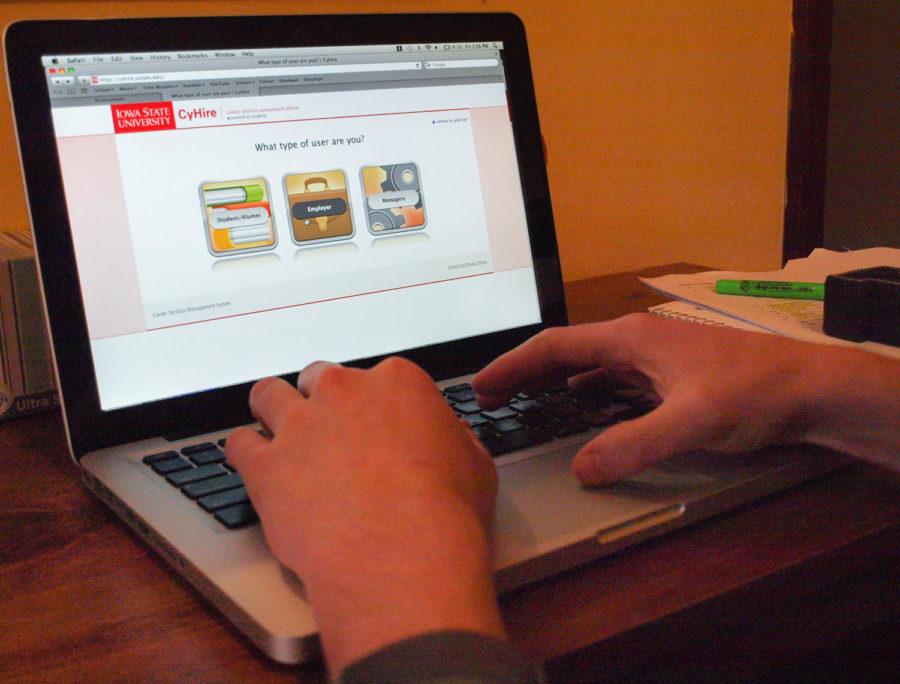Students encouraged to begin internships early
Tiffany Herring/Iowa State Daily
Students can take advantage of Cyhire in their internship search. Cyhire is a database available to Iowa State students that posts internship openings, and dates for important information such as company visits and career fairs.
December 20, 2013
Internships are an important part of every college student’s time on campus.
In today’s job market, almost everyone applying for jobs has one, two or three internships under their belt already. Those who do not have internship experience often get looked over. With so much pressure placed on securing internships, preparations need to be made sooner rather than later.
“I would suggest you make sure you get in to all of the right courses for your major,” said Kim McDonough, program coordinator for the Greenlee School of Journalism. “Working with your college’s adviser is always a good way to ensure that you are enrolled in the right classes.”
McDonough said all journalism students are required to complete one internship before they graduate, but she recommends that students participate in two to three internships to maximize their experience.
Finding companies that fit the students’ interests is another important part of the internship process.
“Students should research companies they want to work for to determine if they would be a good fit with the company,” said Joely Swenson, manager of the Cooperative Education and Internship Programs in Engineering Career Services. “This can be done through CyHire, ISU’s career management system, and by networking at career fairs, such as the upcoming Engineering Career Fair on Feb. 11. Keeping up with coursework is also important, as [students] will be expected to practice and expand upon what [they] have learned while on an internship.”
Many first-year students are already feeling the pressure of internships in their futures.
“We talk about internships in a couple of my classes,” said Payton Busch, freshman in kinesiology. “My professors stress how important they are if we want to get into grad school or find a career that interests us.”
Freshman are also trying to look ahead to when they might be ready to apply for internships.
“I don’t feel like I would be prepared for an internship right now, but I’m confident that after taking my engineering classes next semester, I would be prepared,” said Jason Thomas, freshman in engineering. “If I could get an internship this summer, I would, but I’m guessing I’ll have to wait until the summer after my sophomore year.”
Employers look for many things in an intern, and many things can be done to help boost a student’s chances at landing a good internship.
“Companies look at what classes you’re taking, what all you’re involved with on campus and what experience you have in the field,” McDonough said. “Networking and job shadowing are great opportunities for students, as well.”
Swenson also believes that getting involved is one of the most important things in the internship preparation process.
“Students should start to network early by attending career fairs and company information sessions on campus, even if one isn’t currently actively looking for an internship,” Swenson said. “Those events can all be viewed through CyHire. If you introduce yourself to a recruiter and don’t get an internship right away, chances are that they will remember you the next year if you apply again.
It’s also important to develop effective marketing materials, such as a resume and a cover letter. Engineering Career Services hosts several workshops and seminars on these topics each semester.”
Both McDonough and Swenson encourage students to start looking for internship opportunities right away.
“The sooner, the better,” Swenson said. “Students who become involved with internships are more likely to be employed at graduation when compared to those with no internships. Some companies are looking to hire interns as soon as the summer after their freshman year, so it’s never too early to start.”
Students do not have to be in college to have an internship, either.
“It’s not a bad idea to start looking for internships early,” McDonough said. “We even have some students come into their freshman year with an internship already completed.”
In some cases, McDonough explained, internships can lead to a permanent job offer.
“It happens more than you think,” McDonough said. “A lot of students choose to target organizations that they would like to work for in the future, and end up taking a full-time position after graduation.”







